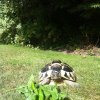Hi All
Just a question re fridge hibernation. Am going to my annual pre hibernation check up tomorrow with our reptile vet who's an advocate of fridge hibernation as the temps fluctuate up and down here in the UK over the winter. Does anyone else do it and any tips for us? Am scared to death so any advice welcome!
Very much appreciated
Helen & Herbie
Just a question re fridge hibernation. Am going to my annual pre hibernation check up tomorrow with our reptile vet who's an advocate of fridge hibernation as the temps fluctuate up and down here in the UK over the winter. Does anyone else do it and any tips for us? Am scared to death so any advice welcome!
Very much appreciated
Helen & Herbie
